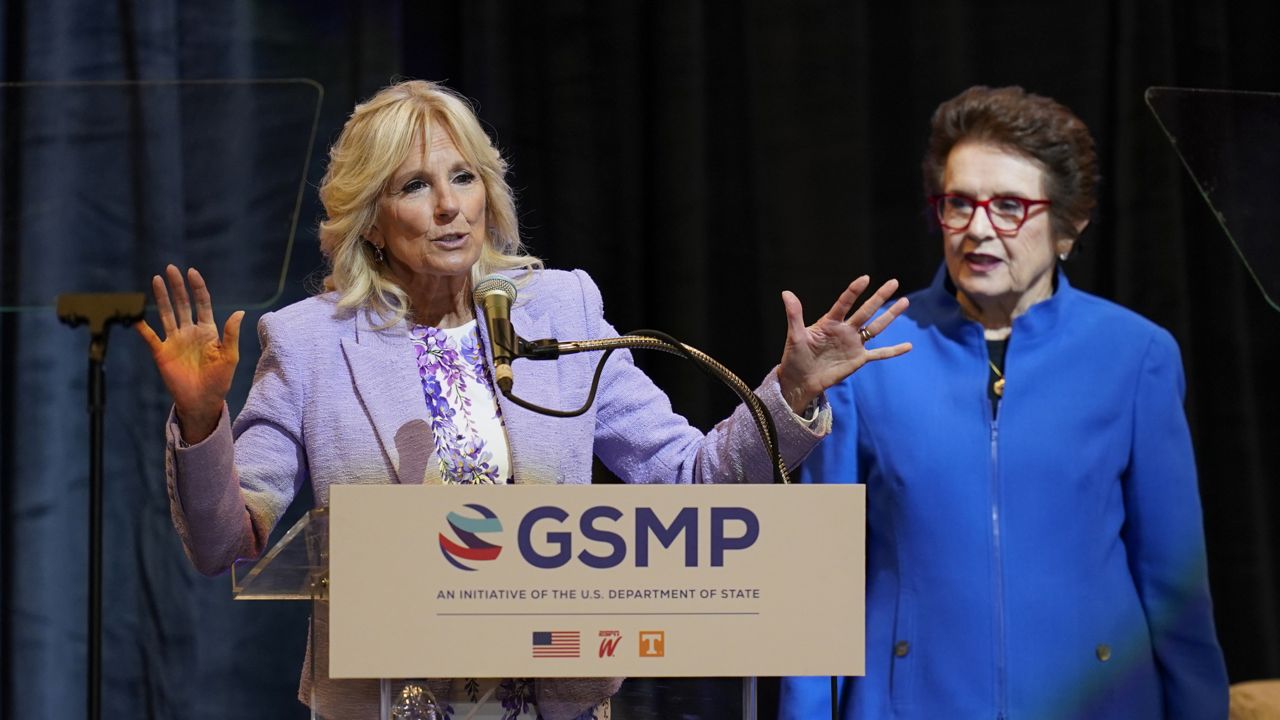First Lady Dr. Jill Biden was joined by female athletes from numerous walks of life on Wednesday to celebrate the 50th anniversary of Title IX, the 1972 provision that prohibits sex-based discrimination in all schools and school activities that receive federal funding.
“For 50 years, Title IX created space for girls and women to be bigger and brighter and stronger and smarter and more capable and courageous,” the first lady said from the event in Washington. “And just look at the legacy it's created. All around us today, here in the United States, millions of girls have grown up able to play sports to build self reliance and self esteem. Our schools have created opportunities for women and sacred spaces that help them fight back against discrimination and sexual violence.”
The 37-word Title IX was meant to update the Civil Rights Act of 1964, which addressed discrimination in employment but not in education. It reads: “No person in the United States shall, on the basis of sex, be excluded from participation in, be denied the benefits of, or be subjected to discrimination under any education program or activity receiving Federal financial assistance.”
Alongside the first lady stood Billie Jean King, the former women’s tennis player – still regarded today as one of the best to ever play the game – who in 1973 famously beat Bobby Riggs in the highly-televised “Battle of the Sexes” match. King has long advocated for equal rights in sports, and more broadly for gender equality as a whole.
“As we stand here today on the eve of the 50th anniversary passage of Title IX, we can celebrate how far we've come – and also take a long look at the work that lies ahead,” King said, adding: “Title IX is one of the most important pieces of legislation of the 20th century.”
King went on to recall her own time as a student athlete before the passage of Title IX, saying in part: “We can never understand inclusion until we’ve been excluded.”
“We must increase compliance with the law. The primary beneficiaries of Title IX have been white, suburban girls,” King went on to say. “Let's use this milestone anniversary to re-energize our focus on strengthening and advancing equity and opportunity for all girls and women, especially those who have been left behind by the law, including girls of color, girls with disabilities, trans athletes and all LGBTQ+ youth. We have to look forward.”
King’s comments came as international sports ruling bodies have increasingly banned transgender women from competing, including a recent decision from world swimming’s governing body FINA.
The Biden administration wants transgender athletes to enjoy the same protections Title IX originally gave to women when it was passed 50 years ago. That stance is at odds with efforts in states across the country.
Without federal legislation to set parameters for this highly technical issue — on the front line of a culture divide that also includes abortion rights, gun control and “ replacement theory,” among other topics — high school athletic associations and legislatures in no fewer than 40 states have filled the void on their own.
There are some 15.3 million public high school students in the United States and a 2019 study by the CDC estimated 1.8% of them — about 275,000 — are transgender. The number of athletes within that group is much smaller; a 2017 survey by Human Rights Campaign suggested fewer than 15% of all transgender boys and transgender girls play sports.
Yet as of May, 19 states had passed laws banning or restricting transgender participation in sports despite the general lack of a problem to address.
The debate essentially boils down to advocates who want to protect the space Title IX carved out for cisgender women — women whose gender identity matches the sex they were assigned at birth — and those who want transgender athletes who compete as females to enjoy the same protections as anyone else. Consensus is nowhere in sight, and the fights are piling up.
The first lady on Wednesday said while celebrating the rights awarded by Title IX, it is time for the rights to be expanded, though she did not delineate any specific policy areas.
“Now, we're not done yet, right? There's a lot of progress that needs to be made to ensure that everyone is protected,” Dr. Biden said.
The Associated Press contributed to this report.



